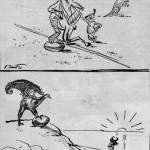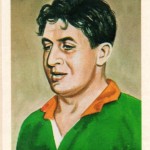History
Taranaki 3 / 3 South Africa – 11 August 1956, Rugby Park New Plymouth
 The Springbok team arrived in New Plymouth in high spirits after winning the second test and constructing an impressive win against Wanganui – scoring 7 splendid tries. There was a feeling in the camp that the tour was back on track and that the team was starting to hit form. The struggling performance against a spirited Taranaki team therefore came as a bit of a shock; a reality check.
The Springbok team arrived in New Plymouth in high spirits after winning the second test and constructing an impressive win against Wanganui – scoring 7 splendid tries. There was a feeling in the camp that the tour was back on track and that the team was starting to hit form. The struggling performance against a spirited Taranaki team therefore came as a bit of a shock; a reality check.
Within context of the tour it was a match as important and influential as the Waikato game. The spirit, commitment and overall performance of the Taranaki team showed the way for the All Blacks according to Terry McLean and this had a highly significant influence on the outcome of not only the third test but also the series:

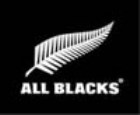 There are a host of international teams like Scotland and Ireland not even to mention second tier test nations like Canada, USA, Italia and Argentina who have never beaten the All Blacks.
There are a host of international teams like Scotland and Ireland not even to mention second tier test nations like Canada, USA, Italia and Argentina who have never beaten the All Blacks.
Wales have beaten the All Blacks only three times, the last time being in 1953. In general the only teams really able to foster some occasional wins against the All Blacks are England, France, Australia and South Africa with the latter being by far the most successful in this regard.
The fact that Rhodesia (now of course Zimbabwe) have once beaten the All Blacks are therefore something really unique and says a lot about the state of rugby in Southern Africa at the time this occurred namely in 1949. The fact that South Africa also white washed the 1949 All Blacks 4-0 in the test series leaves the impression that it was a weak All Black side which is something most rugby scribes strongly reject.
South Africa 36 / 16 Wanganui-King Country (8 August 1956 – Spriggenspark, Wanganui)
Terry Mclean wrote an entertaining piece about this game in his book ‘Battle for the rugby crown’. His pivotal story line is the fact that the Springboks for the first time on tour had some fun and approached the match in a more than usual relaxed manner. Craven actually took two days ‘holiday’ going with his wife to Mount Edmont –he only re-joined the players only the day before the Wanganui match– which might explain the relaxed and abundant behaviour of the players. Almost like kids who have at last escaped the scrutiny of their parents. Continue reading
 This weekend that was I went to a coaching course with a group of players. The course was generally speaking very informative. We rotated through different stations doing basic handling, rucking, tackling and kicking drills with lots of feedback to players and coaches.
This weekend that was I went to a coaching course with a group of players. The course was generally speaking very informative. We rotated through different stations doing basic handling, rucking, tackling and kicking drills with lots of feedback to players and coaches.
At the end we played a game (10 players on each side) called touch and ruck. It is a really nice way to enforce some basic skills at the young age groups. Players learn about maintaining the offside line, to go up in a line on defence and on attack, to touch with both hands (essential to learn that you need to punch through with the arms when you tackle), to rip and place and to clean-out at the rucks.
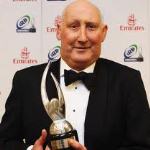 Michael “Jock” Hobbs, a leading figure in New Zealand rugby who helped secure his country’s bid to host last year’s World Cup, died aged 52 on Tuesday after a long battle with cancer, his family said. Continue reading
Michael “Jock” Hobbs, a leading figure in New Zealand rugby who helped secure his country’s bid to host last year’s World Cup, died aged 52 on Tuesday after a long battle with cancer, his family said. Continue reading  2 August 1956, Solway Ground, Masterton: South Arica 19 / Wairarapa-Bush 8
2 August 1956, Solway Ground, Masterton: South Arica 19 / Wairarapa-Bush 8
It was another disappointing Springbok performance and although they won by 11 points all the tries came from individual effort rather than from smooth team work as one would expect after 7 weeks and 15 matches on tour (excluding the 3 weeks and 6 matches in Australia).
 New Zealand Herald recently published their list of 20 All Black greats.
New Zealand Herald recently published their list of 20 All Black greats.
The List referred to above are the players that made All Black rugby what it is or who changed the direction or perception on how the game should be played in New Zealand.
Who are the Springbok legends that formed SA rugby; who made Springbok rugby what it is? Continue reading
 28 July 1956 – Rugby Park, Invercargill
28 July 1956 – Rugby Park, Invercargill
South Africa 23 / Southland 12
Southland hospitality was at play when the Springboks arrived in a cold Invercargill. Lavish entertainment including flights to the beauty spots in the South Island was laid out by the Southland Rugby Union.
17 July 1971 – Sydney Oval, Sydney

 South Africa 19 / Australia 11
South Africa 19 / Australia 11
Not much is available about this Test apart from some Gerhard Viviers commentary (see video below) and brief descriptions of the Springbok tries. There were two changes to the South African team who played against France earlier the season at home.
Morné du Plessis and Hannes Viljoen got their first caps in the places of the injured Tommy Bedford and Gert Muller. The South African team can be seen in the table below.
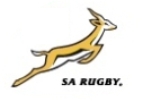 South Africa 27 /West Coast-Buller 6
South Africa 27 /West Coast-Buller 6
Dominating in the scrums and line-outs has so far proven to be not enough for the 1956 Springbok team. Not even halfway thought the tour yet and they’ve already lost two tour matches namely against Waikato and Canterbury as well as the first test in spite of winning the line-out and scrums contests in each of these matches.
The two main problems seem to have been; firstly, an inability to contest at the rucks/tackle ball; secondly, lack of polish in the backline. The lack of structure at the rucks and collision areas has been the main area targeted by the local team’s right from the Waikato match. The primary approach was simply to change the line-outs and scrums into rucks and then to charge through in numbers and/or to put the ball behind the Springboks with box kicks and then charge at the backs.
Canterbury 9 / South Africa 6
This match was a turning point in terms of the media and public’s (in both countries) relationship with Craven and the 1956 Springbok team.
Terry McLean writes: This was the day that Canterbury, for the second time in three encounters, defeated South Africa, this was the night that Danie Craven, after telling me that he was not a happy man, said a critical piece about refereeing in New Zealand, this was the week-end in which he made an official complaint about the quality of New Zealand refereeing and this was the succeeding week in which angry passions were stirred in the backrooms of newspaper offices, both South African and New Zealand, that the Grey River Argus felt impelled to say, “Sour grapes, Dr Craven –very sour grapes indeed!”
The 1956 team was not a particularly happy touring group and struggled to find their feet right from the start of the New Zealand leg of the tour after losing the first match against Waikato. The Springboks had a hard time adjusting to the wet playing surfaces, the rainy/muddy conditions, the flat lying and rush-up defensive style of the New Zealand teams but in particularly with the kick and charge/marauding foot rush tactics of the New Zealand teams. The rucks were a nightmare for the Springboks and they were at loss how to counter the locals’ aggression, structure and ascendency at the tackle ball.
The afternoon of the same morning they arrived from South Africa the Springboks played in their first game against a combined team of Western Australia in PERTH.
Charles Blunt the President of Australian rugby formally welcomed every Springbok with a handshake before the first match (see Picture below).
This picture shows Charles Blunt president of Australia rugby being introduced to the players by Hannes Marais before the first match. Here he shakes hands with Dirk de Vos.
From left to right: Robbie Barnard; Piet Visagie; Johan Spies and Joggie Jansen
One of the brightest stints in the history of Springbok rugby was in 1970 and 1971. In 1970 South Africa of course won the 4 test series against Brain Lochore super All Black team at home. The 1971 international season started off with two tests at home against a French touring side. The Springboks won the first one on 12 June 1971 in Bloemfontein 22-9 and drew the second one 8 all on 19 June 1971 in Durban.
 18 July 1956, Fraser Park, Timaru – Springboks 20 / 8 South-Canterbury & North-Otago & Mid-Canterbury Combined
18 July 1956, Fraser Park, Timaru – Springboks 20 / 8 South-Canterbury & North-Otago & Mid-Canterbury Combined
Craven took a week off –resting at Mount Cook- and under instruction of assistant manager Dan de Villiers the Springbok intentions was to run the ball against a team not likely to front any stiff opposition.
A number of factors combined to derail the effort especially in the last quarter of the second half when the match turned into an extremely scrappy affair. These factors being injuries –before and during the match- poor refereeing, and a general sort of holiday or lack of real application attitude amongst the second stringers. Continue reading
14 July 1956 – Carisbrook, Dunedin: All Blacks 10 / Springboks 6
Test matches are won by taking your changes. The prevailing thought after this test match was that New Zealand deserved to win mostly because they took their chances while South Africa made it easy for them by employing the wrong game tactics, with poor decision making on attack and annoying ball handling errors. Reg Sweet writes in his book ‘Springbok and Silverfern’: “New Zealand had three chances throughout the match. New Zealand took them, and so New Zealand won. It was as straight forward as that.”
The Springbok forwards surprised everyone and were without a doubt the better team in the scrum pushing the All Blacks on repeated occasion’s meters back in the scrum. New Zealand worked out some strategies to counter Claassen in the lineout as the game progressed -making it a bit more of an even contest in the latter stages of the match- but South Africa still won the lineout contest comprehensively 28-35. South Africa won the scrum count 12-21. Reg Sweet wrote: “New Zealand’s pack, astonishing sight, was attempting to heel at times while obviously on the back pedal.”
This Article is a bit out of sequence with the rest of the Atricles on the 1956 Springbok tour. I recently got some more information on the 1956 tour, especially about the Australian leg of the tour. I also needed an Article on the arrival in New Zealand for my web site so I decided to add this information. By the end of this week I will write an Article on the first test of the 1956 series including some video clips.
After a smooth flight of five hours across the Tasman, the Springboks arrived in New Zealand on the evening of Tuesday 5 June. Warwick Roger narrates the arrival as follows in his book ‘Old Heroes’:
 With the international season taking a bit of a breather, I thought some informative statistics would be interesting. I am looking at the home record of the top nations, seeing when was the last time they lost a home test to each of the other nations.
With the international season taking a bit of a breather, I thought some informative statistics would be interesting. I am looking at the home record of the top nations, seeing when was the last time they lost a home test to each of the other nations.
I would think any nation would expect at least a 75% home win record as the minimm standard to attain. anything less would mean your home ground advantage counts for very little and travelling teams do not find it a daunting task to tour.
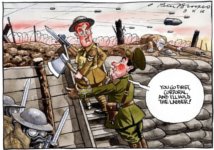 Following on from the Baa-Baas match yesterday, and the inclusion of Tomkins from the rugby league code, I thought I would delve a little deeper into the two codes of rugby union and rugby league and find out why they exist, and perhaps why rugby union is still so jealous of it’s lower class brother.
Following on from the Baa-Baas match yesterday, and the inclusion of Tomkins from the rugby league code, I thought I would delve a little deeper into the two codes of rugby union and rugby league and find out why they exist, and perhaps why rugby union is still so jealous of it’s lower class brother.
7 July 1956 – Carisbrook, Dunedin
South Africa 14 / Otago 9
Dunedin and Otago has to some extend been to New Zealand rugby what Stellenbosch and Western Province rugby were to South African rugby. Both University cities that lost their respective roles as gateways to the respective national sides due to the professional era and neither Stellenbosch nor Dunedin is today the rugby powerhouses or talent accumulators if not developers it used to be.
South Africa 41 / Nelson Combined 3
The 1956 Springboks had two matches left to start playing as a team before the first test, it was not about notching up results anymore it was time for the forwards to start playing as a pack and for the backline to show some polish.
South Africa 22 / Hawkes Bay 8
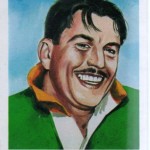 This match was played in the looming shadow of the first test on the back of mounting concern about the Springboks inability to hit form and constant worries about injuries to players.
This match was played in the looming shadow of the first test on the back of mounting concern about the Springboks inability to hit form and constant worries about injuries to players.
As a consequence different players and combinations were selected in the key positions in literally every match so far on tour.
 Springboks 22 / Poverty Bay-East Coast Combined 0
Springboks 22 / Poverty Bay-East Coast Combined 0
The Springboks travelled by plane -for the first time on tour- from Wellington to Gisborne to play a combined Poverty Bay-East Coach team.
Gisborne was a lovely town (now a city) nestling amid the hills and woods which fringe Poverty Bay, where Captain Cook made his first landing in Aotearoa. Continue reading
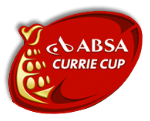 The first Currie Cup Final was played in 1939 (before that the Currie Cup did not have a Final Game), at Newlands when Transvaal beat Western Province. The Sharks (a.k.a. Natal) are back in the Final for the second year in a row and will be playing the Golden Lions (a.k.a. Transvaal) for the fourth time in a Currie Cup Final.
The first Currie Cup Final was played in 1939 (before that the Currie Cup did not have a Final Game), at Newlands when Transvaal beat Western Province. The Sharks (a.k.a. Natal) are back in the Final for the second year in a row and will be playing the Golden Lions (a.k.a. Transvaal) for the fourth time in a Currie Cup Final.

